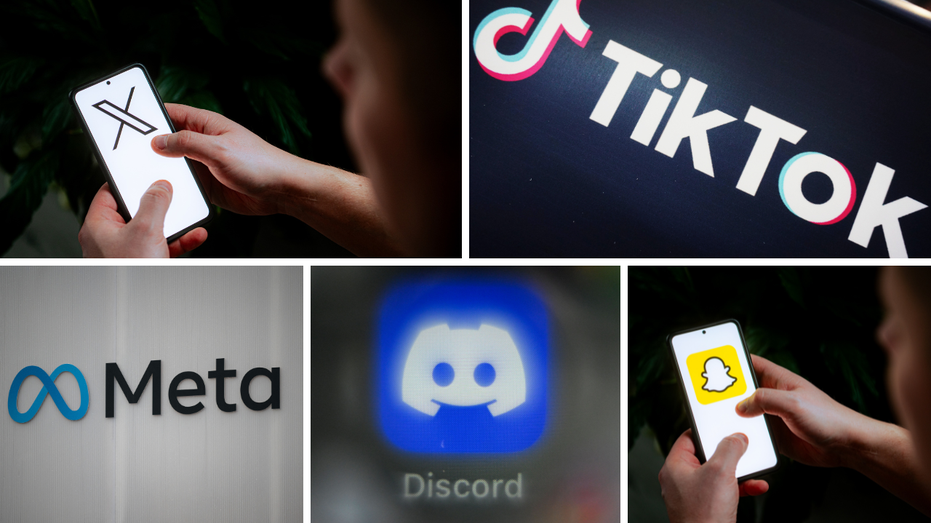Social media is a breeding ground for predators, child sexual exploitation and human trafficking, expert says
Grooming and sexual exploitation of America's minors is ticking up, expert says
Tim Tebow launches campaign combating $150B human trafficking industry
Former NFL star Tim Tebow shares his new mission to help save children in peril all around the globe on 'Maria Bartiromo's Wall Street.'
In the digital age, children have the world at their fingertips if they have access to the internet, which has led to the proliferation of grooming and sexual exploitation of America's minors, an expert told Fox News Digital.
Daniel Clemens, the CEO of ShadowDragon, has nearly 20 years of experience in digital forensics working closely with law enforcement to help solve crimes that leverage technology and the internet, including assisting in the identification and apprehension of numerous human traffickers.
"What we do is we collect a large amount of information or enable our customers to collect information through our platform to visualize the internet breadcrumbs that may be available through various platforms," Clemens explained. "Anywhere where somebody is interacting online, our bread and butter is really adapting to the human interactivity of what platforms they interact with, so there's all sorts of insights to look at from your social media websites to news sites to workout sites to chess sites."
"There's always something that helps you put together the pieces of a story of who someone is and what they believe and what their motives are," he added.

The CEOs of Meta, X, TikTok, Snap and Discord will testify on Capitol Hill on Wednesday. (Getty Images / Getty Images)
Clemens explained to Fox News Digital that some tech platforms take on child exploitation and human trafficking better than others, while they have also seen platforms either look the other way or be entirely ignorant of the issue.
Similar concerns have also been expressed by Congress and on Wednesday, the Senate will hold a hearing focused on child sexual exploitation across big tech platforms featuring the CEOs of Meta, X, TikTok, Snap and Discord. The CEOs of X, Discord and Snap will testify pursuant to subpoenas issued by the Senate Judiciary Committee after they repeatedly refused to testify, while the CEOs of Meta and TikTok voluntarily agreed to testify, a press release announcing the hearing said.
"When we held our first hearing on protecting children online with experts and advocates earlier this year, Big Tech griped about not getting an invitation," Sen. Dick Durbin, D-Ill., and Sen. Lindsey Graham, R-S.C., said in an announcement. "We promised them that their time would come. But when they were offered their chance to testify, some companies outright refused to make their CEOs available."
"We’ve known from the beginning that our efforts to protect children online would be met with hesitation from Big Tech," they added. "They finally are being forced to acknowledge their failures when it comes to protecting kids. Now that all five companies are cooperating, we look forward to hearing from their CEOs. Parents and kids demand action."
Clemens attributed social media as one of the leading factors negatively impacting society, specifically children. He argued that limits should be set, such as age restrictions for America's youth, because he considers social media interactions to be like a drug.
"Let's think about social media as a drug, there's a constant dopamine hit when you're interacting with something that's always interacting with you," he said. "So a long time ago we put restrictions on alcohol... it began as a chemical imbalance or a chemical dependency on something else, and social media is worse than that because it's constantly hitting. It's designed to always pull you in and then that also is designed to make it, so you're dehumanizing everything around you."
‘SOCIAL DILEMMA’ STAR SAYS META LAWSUIT WILL HAVE ‘LASTING IMPACT,’ COMPARES FACEBOOK TO BIG TOBACCO
Clemens explained that the data collected by ShadowDragon shows the proliferation and increase in questionable sites within the dark web just between 2022 and 2023, which has seen a 50% increase in sites categorized as "likely illegal content."
"Over the course of a four-year period of time, we've been able to categorize over a quarter million different sites that have grown," he said. "From four years ago, there were 10,000 sites that we had categorized as questionable and likely illegal content. Now, it's over a quarter million that we're seeing yearly versus 10,000 yearly, so that's like one area of growth that we've seen just in the dark web."

The Facebook logo is being displayed on a smartphone among other social media networks on a smartphone. (Getty Images / Getty Images)
On social media sites in general, Clemens said the main thing he and his team look for is "long-term grooming operations" where they've reportedly seen high school girls targeted and "within 6 to 8 weeks, they're moved into a position where they go meet somebody, and then they're taken."
"In some of the video game sites, let's say like, Roblox or Minecraft, the communities that are in some of those online areas, it's a complete cesspool," he said. "They're [predators] moving from bringing up topics about horrible stuff to get kids to start talking about things that are inappropriate, to then start normalizing inappropriate content, speech and then sharing images … intentionally going for a long term grooming activity."
Meta specifically, which includes Facebook and Instagram, is accused of facilitating and profiting off of the online solicitation, trafficking and sexual abuse of children, including allowing child predators to use dark web message boards to share tips with each other about victimizing children and reportedly rejecting its own safety teams’ recommendations to make it harder for adults to communicate with children on its platforms, according to an updated complaint reviewed by Fox News Digital filed by New Mexico Attorney General Raúl Torrez.
He said "anything" that is on a phone, tablet or computer that a child has access to can lead to grooming, exploitation or human trafficking, which has made the issue much more pervasive in the digital age.
"It used to be, 'Oh, we're going to watch our kids with who they interact with in a physical setting,'" Clemens continued. "'Our kids are going to tell us if there were any questions or strange hugs or anything like that' [and] in a physical place, that's fairly limited."
DAUGHTER'S HARASSMENT ON SOCIAL MEDIA PROMPTS FORMER META ENGINEER TO TESTIFY BEFORE CONGRESS
"But then when you start giving these kids phones, tablets, computers, you're giving the world access to your kid, anything they interact with," he added. "It is now normalized where there are strange networks of people that start initiating conversations with your kids. If you think about any video game platform, it's almost the norm now."
Clemens suggested parents go back to some of the basics, including teaching your child about "stranger danger" and how that manifests on internet platforms, while also building a strong parental relationship where children feel confident enough to share what is going on.
"It's about communication with your kids and making sure that you have a good relationship with your children where they want to talk to you about everything that goes on in their day and that helps with the technology side and going to school or wherever they're going to go," he said. That includes "being engaged with your kids more than just having video games or social media platforms or whatever you give them on a tablet" to instead "be the babysitter."
Instead of "just banning everything," Clemens said parents should be selective on privacy controls within each one of those platforms, such as preventing kids from communicating verbally with strangers on video games, for example.

Meta CEO Mark Zuckerberg will be among the CEOs testifying on Wednesday. (Beata Zawrzel/NurPhoto via Getty Images / Getty Images)
"'Why is an adult talking to you?' That's weird," he said. "Why are they asking you any questions about where you go to school or who your friends are? Or, if they ask for anything that has to do with pictures or anything like that, those are all red flags."
By using consumer available information, Clemens said they can share it with law enforcement and nonprofits to better understand how predators use these platforms to target children. Although, he admitted that there is the conflict between freedom of speech and the safety of naive children interacting with the world, which many of the CEOs within America's largest technology and social media companies, as well as the government, must contend with.
CLICK HERE TO GET THE FOX NEWS APP
"At some point, what are our obligations as a society to protect their innocence," he said. "From a government perspective and a regulation perspective… what's your level of due diligence there, and I think we can make it a bipartisan issue by just asking questions like… 'What level of maturity are we at as a society for these platforms that everybody's interacting on to provide some level of protection for children?'"
"I think that the public really needs to know how bad some of this is, some of these communications are, and it's not for the light of heart, I'll tell you that," he concluded.




















